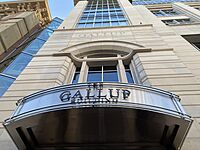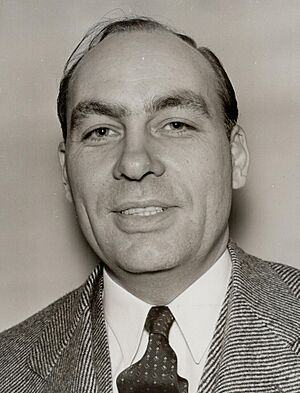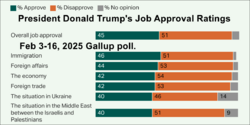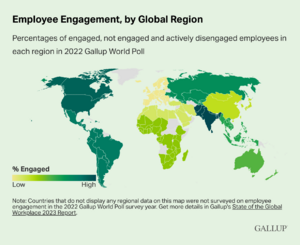Gallup, Inc. facts for kids
 |
|

Gallup Organization headquarters in Washington, D.C.
|
|
|
Formerly
|
|
|---|---|
| Private | |
| Industry | Management consulting |
| Founded | 1935 in Princeton, New Jersey, U.S. |
| Founder | George Gallup |
| Headquarters | The Gallup Building, 901 F Street, NW, Washington, D.C.,
U.S.
|
|
Number of locations
|
30–40 offices globally (2017) |
|
Key people
|
|
| Services |
|
| Owner | Employee-owned |
Gallup, Inc. is a company from the United States that helps other organizations. It is based in Washington, D.C.. George Gallup started the company in 1935. Gallup became famous for its public opinion polls, which are surveys that ask people what they think. Today, Gallup helps businesses and groups around the world. They offer advice, research, and tools like the CliftonStrengths assessment. They also publish books about business and management.
Contents
About Gallup: How It Works
Gallup is a private company owned by its employees. Its main office is in Washington, D.C.. The company has about 1,500 employees and 30 to 40 offices worldwide. These offices are in big cities like New York City, London, and Singapore. In 2022, Jon Clifton became Gallup's CEO. His father, Jim Clifton, was the CEO before him.
It is important to know that Gallup, Inc. is not connected to Gallup International. Gallup International is a different survey company based in Switzerland. George Gallup also started that group in 1948. Gallup, Inc. has taken legal action against other groups for using the "Gallup" name without permission.
Gallup's Journey: A Look Back
How Gallup Started in the 20th Century
George Gallup (1901–1984) began his first company, the American Institute of Public Opinion, in Princeton, New Jersey, in 1935. This company was the start of what is now the Gallup Organization. George Gallup wanted his surveys to be fair. He made sure to ask people from all different groups of voters. He also decided not to do surveys for political parties like the Republicans or Democrats. Gallup still follows this rule today.
In 1935, George Gallup released his first survey about politics. In 1936, Time magazine said that Gallup's survey data was very accurate. That same year, Gallup correctly predicted that Franklin Roosevelt would win the U.S. presidency. This was a big deal because another popular magazine, The Literary Digest, predicted the opposite. This success made Gallup very well-known and a leader in American polling. By 1938, Gallup also started doing research for advertising and movie companies.
By 1948, Gallup's company had survey groups in many other countries. Gallup's survey results were also printed in newspapers in the U.S. and other places. The modern Gallup Organization was formed in 1958. This is when George Gallup brought all his survey operations together into one company.
George Gallup passed away in 1984. Four years later, his family sold the company to Selection Research, Incorporated (SRI). SRI was a research company from Lincoln, Nebraska. George Gallup's sons, George Gallup Jr. and Alec Gallup, stayed involved with the company. SRI was founded in 1969 by a psychologist named Don Clifton. SRI focused on market research and choosing the right people for jobs. They were known for using special interviews to find talented people.
After being sold to SRI, Gallup changed its focus. It became a company that helps businesses with research and advice. They work with companies to solve problems with their employees and customers. Gallup still does public surveys and shares the results.
In the 1990s, Gallup created a set of 12 questions called Q12. These questions help businesses understand how involved and happy their employees are. Gallup also partnered with USA Today and CNN to do surveys. They also launched their Clifton StrengthsFinder online tool. In 1999, Gallup experts wrote a very popular book about management called First, Break All the Rules.
Gallup in the 21st Century
In 2002, Fortune Small Business magazine said that the success of First, Break All the Rules helped Gallup's consulting business grow a lot.
In 2013, Gallup reached an agreement with the U.S. Department of Justice. This agreement involved $10.5 million. It was related to claims that Gallup had made mistakes in its billing for some government contracts. Gallup agreed to the settlement, but there was no finding that they were at fault.
Gallup decided not to do "horse-race polling" for the 2016 United States presidential election. Horse-race polling means predicting who will win an election. Gallup wanted to focus more on its consulting business. In 2015, Frank Newport, who was Gallup's editor-in-chief at the time, said that surveying the public on important issues was a better use of their time.
What Services Does Gallup Offer?
Gallup is famous for its Gallup Poll, but this poll makes up only a small part of the company's income. Gallup also offers many other services. These include research and advice for businesses. They have the Q12 employee engagement survey and CliftonStrengths.
The Q12 survey asks employees 12 questions about their workplace, co-workers, and managers. This helps measure how involved employees are. It also helps managers and companies improve how productive they are. CliftonStrengths, also known as StrengthsFinder, is a test that helps people find their top five natural talents. It then gives them a report on how to use these strengths.
For schools, Gallup works with teachers and school systems. They help schools focus on students' strengths and make learning more engaging. Gallup also runs the Gallup Student Poll in the U.S. This poll measures how successful students are based on their hope, involvement, and overall well-being.
The Gallup Poll: Public Opinion Surveys
Polling in the United States
Historically, the Gallup Poll has used surveys to understand what the public thinks. They track opinions on political, social, and economic topics. This includes sensitive or difficult subjects. The results, analysis, and videos from the Gallup Poll are published daily as news. Doing these polls costs Gallup about $10 million each year. However, it makes the Gallup name well-known, which helps promote their business research. In 2019, Mohamed Younis became the new editor-in-chief for the Gallup News team.
How Gallup Conducts Daily Surveys
Until 2018, Gallup's daily surveys included two main polls. One was about U.S. politics and the economy. The other was the Gallup–Healthways Well-Being Index. For both surveys, Gallup interviewed 500 people across the U.S. every day, for 350 days a year. About 70% of these interviews were on cellphones, and 30% were on landlines.
Gallup's daily surveys used live interviewers. They called random phone numbers, including both landlines and cellphones. This helped them reach people who only use cellphones. They also tried calling multiple times to reach people who did not answer at first.
The results from Gallup's U.S. surveys came from standard national phone samples. They used a careful design to pick random phone numbers from all working phone areas. This included unlisted phone numbers.
For landline calls, they tried to interview an adult aged 18 or older in the household who would have the next birthday. For cell phone calls, they did not use the same method because cell numbers are usually for one person. Gallup's daily surveys included interviews in Alaska and Hawaii. They also conducted interviews in Spanish.
When people were chosen randomly for interviews, every adult had an equal chance of being picked. A typical Gallup poll, or one night of daily surveying, included about 1,000 adults. This means the results had a margin of error of about 4 percentage points. Gallup's daily survey process allowed them to combine many interviews. This helped them look at smaller groups of people in more detail.
After collecting the survey data, Gallup adjusted the results. They made sure the group of people surveyed matched the latest information about the U.S. adult population from the U.S. Census Bureau. Gallup adjusted the data for things like gender, race, age, education, and region.
The data was adjusted daily based on the number of adults in a household and how much people used cellphones. This helped correct for any differences in how people were chosen. The data was then adjusted again to make up for people who did not respond. This used targets from the U.S. Census Bureau for age, region, gender, education, Hispanic background, and race. The final group of people surveyed represented about 95% of all U.S. households.
How Accurate Are Gallup Polls?
From 1936 to 2008, Gallup Polls correctly predicted the winner of the U.S. presidential election most of the time. There were a few exceptions. In 1948, almost all pollsters, including Gallup, predicted that Thomas Dewey would win over Harry S. Truman. But Truman won, leading to the famous "Dewey Defeats Truman" newspaper headline. In 1976, Gallup incorrectly predicted a small win for Gerald Ford over Jimmy Carter. For the 2008 U.S. presidential election, Gallup correctly predicted the winner. However, it was ranked 17th out of 23 polling groups for how close its predictions were to the final results.
In 2012, Gallup incorrectly predicted that Mitt Romney would win the 2012 United States presidential election. Gallup's final survey had Mitt Romney at 49% and Barack Obama at 48%. The actual election results showed Obama with 51.1% and Romney with 47.2%. A poll expert named Nate Silver found that Gallup's results were the least accurate among 23 major polling firms. Their predictions were, on average, 7.2 points away from the final result.
After the 2012 election, Gallup spent six months looking at its methods. The company found that its methods had problems. They made too few phone calls in the Eastern and Pacific time zones. They also guessed too high for the number of white voters. And they relied on listed landline phones, which meant their sample included more older people.
Frank Newport, who was Gallup's editor-in-chief at the time, said that Gallup only tries to estimate the national popular vote, not predict the winner. He also said their final poll was within the expected margin of error. Newport also criticized experts like Silver who combine and analyze other people's polls. He said it is "much easier, cheaper, and mostly less risky" to do that.
In 2012, poll expert Mark Blumenthal said that Gallup usually surveyed slightly fewer Black and Hispanic Americans. This led to about a 2% shift away from Barack Obama in their results. However, Blumenthal also praised Gallup for being open about its methods. He suggested that other polling companies should also share their raw data and methods.
In 2013, some people questioned the accuracy of Gallup's surveys on religious faith. Gallup's surveys on religion in the U.S. showed results that were a bit different from other studies. For example, a 2012 study by the Pew Research Center found that people who do not have a religious connection were a fast-growing group in the U.S.
In 2016, The Wall Street Journal compared Gallup's unemployment numbers with those from the U.S. Bureau of Labor Statistics (BLS). This comparison was for the years 2010 to 2016. The numbers were almost exactly the same, and the trends matched very closely. This showed that Gallup's methods produce results that are similar to government agencies, even though the BLS surveys many more people.
Gallup World Poll: Global Surveys
In 2005, Gallup started its World Poll. This poll continuously surveys people in 160 countries. This covers more than 98% of all adults in the world. The Gallup World Poll asks over 100 questions that are used globally. It also asks questions specific to different regions. It includes global measures like law and order, food and shelter, good jobs, and well-being. Gallup also works with organizations, cities, and governments to create special questions and measures. This helps them gather information on specific topics they are interested in.
Gallup also publishes other studies and results. These include its State of the Global Workplace report, Global Emotions report, and Rating World Leaders report.
How the Gallup World Poll Works
Gallup interviews about 1,000 people in each country. They aim to survey all adults aged 15 and older who are not in institutions like hospitals or prisons. Gallup asks each person the survey questions in their own language. This helps make sure the results can be compared fairly.
Gallup uses phone surveys in countries where at least 80% of the population has phone service. If fewer than 80% have phone service, Gallup uses face-to-face interviews.
Surveys on China
Gallup is known for its public opinion surveys about China. Its latest survey, published in March 2023, showed that only 15% of Americans had a good view of China. This was a record low since Gallup started measuring this in 1979.
In early November 2023, Gallup announced that it had closed all its operations in China. Gallup first started working in China in 1993.
Gallup's Awards for Great Workplaces
For over 15 years, Gallup has given out the Gallup Exceptional Workplace Award. This award goes to organizations that meet high standards. These standards are based on the Q12 employee engagement survey. This survey includes looking at information from more than 2.7 million workers across over 100,000 teams.
Gallup Press: Books and Publishing
Gallup has its own publishing division called Gallup Press. By 2015, Gallup Press had published about 30 books. These books are about business and personal well-being. Some of their recent books include It's the Manager, Wellbeing at Work, and Blind Spot. Other well-known Gallup Press books are First, Break All the Rules and StrengthsFinder 2.0. In 2017, StrengthsFinder 2.0 was reported to be one of Amazon's 20 best-selling books of all time.
More to Explore
- Gallup's most admired man and woman poll
- Gallup's List of Most Widely Admired People of the 20th Century
- George H. Gallup House
- CliftonStrengths
 | Jewel Prestage |
 | Ella Baker |
 | Fannie Lou Hamer |




